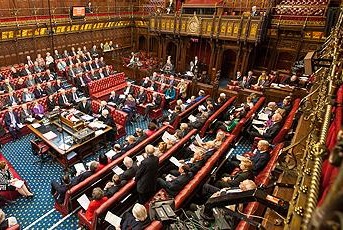Justice and Home Affairs Committee warns timetable for changes is extremely ambitious and public awareness is low
The Justice and Home Affairs Committee of the House of Lords today published a letter sent to immigration minister Tom Pursglove setting out its concerns over forthcoming technological border changes.
 Image credit: UK GovernmentYou can read the 36-page letter here.
Image credit: UK GovernmentYou can read the 36-page letter here.
Following an inquiry into electronic border management systems, the Committee's letter considers the introduction of the Electronic Travel Authorisation (ETA) by the Home Office and the introduction of two new systems by the EU, the Entry/Exit System (EES) and the Electronic Travel Information and Authorisation System (ETIAS).
The new schemes will have a significant impact on the UK's border, and the Committee's letter sets out its detailed concerns over the Government's readiness for the changes.
The letter explains:
The EES is an automated IT system for registering non-EU nationals travelling for a short stay each time they cross the external borders of Schengen countries. The "EES is a border crossing system designed to capture facial images, four (4) fingerprints from the right-hand and the biographic data associated with the traveller's passport. EES is not a travel authorisation". The EES applies to non-EU nationals travelling to a European country using the EES for a short stay of up to 90 days within any 180-day period.
ETIAS is an entry requirement for visa-exempt nationals travelling to European countries. It is a pre-travel authorisation system comparable to the UK's ETA. Hence, most UK citizens will need to submit an online application prior to travelling to the Schengen Area countries. With a valid ETIAS travel authorisation, one can enter the territory of 30 European countries as often as one wants for short-term stays–normally for up to 90 days in any 180-day period. The introduction of ETIAS will follow EES.
The UK's ETA has been described by the Home Office as a "digital permission to enter the UK", for those visitors who do not need a visa for short stays. The ETA was initially introduced in late 2023 for citizens from Qatar. On 1 February 2024, the scheme opened for nationals of Bahrain, Kuwait, Oman, United Arab Emirates, Saudi Arabia and Jordan, who have been required to obtain an ETA to travel to the UK since 22 February 2024. Similar travel authorisation schemes operate in other countries such as the USA's ESTA and Australia's ETA, although there are important differences between these systems.
The Justice and Home Affairs Committee warns that the timetable for the implementation of changes at the border is extremely ambitious and expresses alarm at the lack of public awareness of these changes.
"We are concerned that public confidence in the UK's border management could be undermined by a pace of change which is too swift and by a potentially uncoordinated approach to implementation," the Committee said.
Lord Foster of Bath, the chair of the Justice and Home Affairs Committee, said planning for a gradual and well co-ordinated implementation of the new schemes is vital to ensure chaos at the UK's borders is avoided.
More generally, the Committee also expresses concerns at the Home Office attitude to independent scrutiny and oversight, as exemplified by the recent sacking of David Neal, the last Independent Chief Inspector of Borders and Immigration.
The letter states: "We are concerned that the Home Office appears to have a closed approach to independent scrutiny. We are concerned by the apparent absence of the necessary processes and infrastructure which would allow the Home Office and Border Force to 'learn lessons' when things go wrong.
"The Committee is troubled by the Government's approach to the role of Independent Chief Inspector of Borders and Immigration. We are disappointed that a lengthy vacancy has been allowed to occur at a time when new systems are being introduced. The role should be filled urgently, and we encourage the next Chief Inspector to monitor the rollout of the ETA."